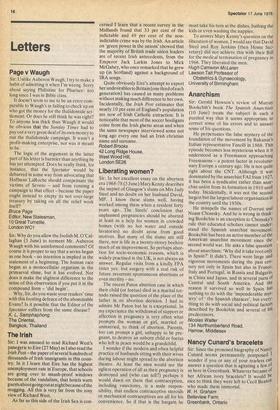Anarchism
Sir: Gerald Howson's review of Murray Bookchin's book The Spanish Anarchists (10 June) treats the subject in such a puzzled way that it seems appropriate to correct some of his errors and to answer some of his questions.
He perpetuates the false mystery of the foundation of the movement by Bakunin's Italian representative Fanelli in 1868. This episode becomes less mysterious when it is understood as a Freemason approaching Freemasons — a potent factor in revolutionary Europe a century ago. He is not quite right about the CNT. Although it was dominated by the anarchist FAI from 1927, it has been a syndicalist rather than anarchist union from its formation in 1910 until today. Incidentally, it was not the second largest but the largest labour organisation in the country until the 1930s. He misspells the names of Durruti and Noam Chomsky. And he is wrong in thinking Bookchin is an exception to Chomsky's rule that educated scholars cannot understand the Spanish anarchist movement; Bookchin has been an active member of the American anarchist movement since the second world war. He asks a false question about anarchism: 'Why did it take root only in Spain?' It didn't. There were large and vigorous movements during the past century not only in Spain but also in France, Italy and Portugal, in Russia and Bulgaria, in China and Japan, and in several parts of Central and South America. And the reason it survived so well in Spain has nothing to do with the 'imponderable mYs' tery' of' the Spanish characer', but everything to do with social and political facto0 described by Bookchin and several of his predecessors.
Nicolas Walter 134 Northumberland Road, Harrow, Middlesex


































 Previous page
Previous page